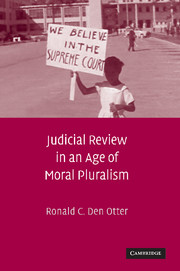Book contents
- Frontmatter
- Contents
- Acknowledgments
- Introduction
- 1 Public Justification and Constitutional Theory
- 2 Freedom and Equality in Constitutional History
- 3 The Challenge of Public Justification
- 4 Competing Conceptions of Public Reason
- 5 Constitutional Public Reason
- 6 The Limits of Public Justification
- 7 Standard Objections to Public Reason
- 8 Easier Cases
- 9 Harder Cases
- 10 The Case for Judicial Review
- Conclusion
- References
- Index
- References
8 - Easier Cases
Published online by Cambridge University Press: 17 December 2010
- Frontmatter
- Contents
- Acknowledgments
- Introduction
- 1 Public Justification and Constitutional Theory
- 2 Freedom and Equality in Constitutional History
- 3 The Challenge of Public Justification
- 4 Competing Conceptions of Public Reason
- 5 Constitutional Public Reason
- 6 The Limits of Public Justification
- 7 Standard Objections to Public Reason
- 8 Easier Cases
- 9 Harder Cases
- 10 The Case for Judicial Review
- Conclusion
- References
- Index
- References
Summary
In the next two chapters, I concern myself with the details of how judges should hold lawmakers to the standard of public justification. In doing so, I refer to some of the best-known constitutional issues to render my exclusive principle of public reason less abstract: freedom of religion, same-sex marriage, affirmative action, and abortion. I use particular cases as examples of when the Court met or failed to meet the standard of public justification, and then in some instances, I explain why the concurring or dissenting opinion was more publicly justified. When none of the opinions is sufficiently publicly justified, I offer my own thoughts as to how such an opinion could have been written. The point is not to claim that these hypothetical opinions are necessarily correct but to illustrate the kinds of opinions that could be publicly justified, and therefore could guide future judicial decision making.
RELIGIOUS FREEDOM
In Wisconsin v. Yoder, three Amish men, Wallace Miller, Jonas Yoder, and Adin Yutzy, were charged with violating a Wisconsin law that made school attendance compulsory until the age of sixteen. The crime was a misdemeanor, with penalties ranging from a minimum of a $5 fine to a maximum of a $50 fine and three months in jail. The defendants were convicted and fined $5 each but were reluctant to appeal their convictions because of the Christian principle of not “going to law” to resolve disputes.
- Type
- Chapter
- Information
- Judicial Review in an Age of Moral Pluralism , pp. 231 - 261Publisher: Cambridge University PressPrint publication year: 2009



